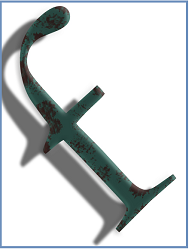LITERACY PRACTICES OF PORTUGUESE TEACHERS IN INITIAL FORMATION: BETWEEN SCHOOL AND UNIVERSITY
DOI:
https://doi.org/10.22481/folio.v12i1.6610Keywords:
Eventos e práticas de letramentos; Formação de professores; Novos Estudos do LetramentoAbstract
Assuming the literacy studies perspective, the present work investigates how Portuguese teachers (res)signify their textual production literacy practices in the academic context. Therefore, we will start from the concept of literacy events, understood as observable episodes that emerge from practice; and from the concept of literacy practices, understood as the general ways of using writing in events. The analyses universe covers a group of Portuguese teachers in initial formation, enrolled in the Textual Production subject, offered in the second semester of a degree course at a federal university in the interior of the state of Rio Grande do Sul. The data were generated from a semi-structure questionnaire, answered by 31 participants, whose questions showed the teaching and learning process of textual production at school and university. For data analysis, the following procedures were used: i) identification of resources rich in meaning and elaboration of semantic categories of analysis, ii) comparison between the literate practices experienced at university and school and iii) verification of the proximity/distancing between the described practices. The results show that the teachers in formation understand the literacy process as individual, focusing in structural and normative aspects.
Downloads
References
2. BARTON, D.; HAMILTON, M. Literacy practies. In: BARTON, D.; HAMILTON, M.; IVANIC, R. Situated literacies Reading and writing in context. Nova Iorque: Routledge, 2004, p. 7-15.
3. BARTON, E. Linguistic Discourse Analysis: How the Language in Text Works. In: BAZERMAN, C.; PRIOR, P. (Ed.). What Writing Does and How It Does It: An introduction to Analyzing Texts and Textual Practices. New Jersey: Lawrence Erlbaum Associates, 2004. p. 57-82.
4. BAZERMAN, C. Judith C. Hoffnagel; Ângela P. Dionísio (orgs). Gêneros, agência e escrita. São Paulo: Cortez, 2006.
5. FIAD, R, S. A escrita na universidade. Revista da ABRALIN, v. eletrônico, n. especial, t. 2, p. 357-369, 2011. Disponível em: <https://revistas.ufpr.br/%20abralin/article/view file/32436/20585> Acesso em: 31 jan. 2020.
6. KLEIMAN, Ângela. Modelos de letramento e as práticas de alfabetização na escola. In: ______. (org.). Os significados do letramento: uma nova perspectiva sobre a prática social da escrita. Campinas: Mercado de Letras, 1995. p. 15-61.
7. LEA, Mary R. I thought I could write till I came here: Student writing in Higher Education. In: GIBBS, G (ed.) Improving student learning: theory and practice. Oxford: Oxford Centre for Staff Development, 1994. p. 216-226.
8. ______; STREET, Brian V. Student writing in high education: an academic literacies approach. Studies in Higher Education, v. 23, n. 2, p. 157-172, 1998. Disponível em: <https://www.tandfonline.com/doi/abs/10.1080/03075079812331380364> Acesso em: 20 jan. 2020.
9. LILLIS, Tereza. Student writing: access, regulation, desire. London: Routledge, 2001.
10. STREET, Brian. Eventos de letramento e práticas de letramento: teoria e prática nos novos estudos do letramento. In: MAGALHÃES, I. (org.). Discursos e práticas de letramento. Campinas: Mercado de Letras, 2012. p. 69-92.
11. ______. Literacy in Theory and Practice. New York: Cambridge University Press, 1984.
12. ______. What’s new in New Literacy Studies: critical approaches to literacy in theory and practices. Current Issues in Comparative Education. Columbia University, v. 5, n.2, p. 77-91, 2003.
13. TERRA, M. R. Letramento & letramentos: uma perspectiva sócio-cultural dos usos da escrita. DELTA [online], vol.29, n.1, 2013. Disponível em: <http://www.scielo.br/ scielo.php?script=sci_arttext&pid=S0102-44502013000100002> Acesso em: 07 fev. 2020.
Downloads
Published
Issue
Section
License












